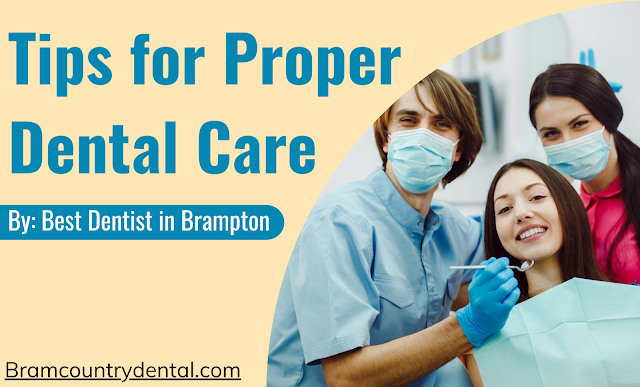For Beautiful and
healthy teeth to require proper dental care. When you know how to do something
good for your teeth, it's straightforward.
Best
Dentist in Brampton has
put together best dental care tips for healthy and beautiful teeth.
1. Brush teeth twice a day
In the morning
and the evening, you should brush your teeth thoroughly and persistently about
half an hour after meals. But be careful: After consuming acidic foods (for
example, fruit juices or spinach), you should never brush your teeth directly,
as the enamel is susceptible.
2. The proper cleaning technique
So that brushing
your teeth protects you effectively, the proper brushing technique is crucial.
The wrong brushing technique or too intensive scrubbing can promote the
breakdown of tooth enamel and irreparably damage the gums.
When you visit
the best Dentist in Brampton, you can explain and show the correct
brushing method. The so-called "red-white technique" is simple and
effective, i.e., from the gums to the tooth, so that the gums are not
"scrubbed away."
- First, clean
the outer surfaces, then the inner surfaces - two to three teeth at a
time.
- Then the
chewing surfaces follow, whereby the bristles of the toothbrush should lie
vertically.
- Don't forget
about the molars, including the areas behind the last tooth.
3. Choose right toothbrush
Short-headed
brushes also reach the rear molars well.
The brush should
have three to four rows of bristles and lay comfortably in hand - this
guarantees optimal guidance.
Medium-hard,
rounded bristles made of plastic prevent injuries to the gums.
You should buy a
new brush after two to three months at the latest. The old one removes 30
percent less plaque and is full of bacteria. It is especially true after
diseases in the oral cavity, such as a fungal infection such as oral thrush or
inflammation of the gums.
Younger
generation electric toothbrushes clean better than hand brushes. They are
particularly suitable for children: the quick, automatic movements of the brush
make cleaning easier. And that with a cleaning time of only two minutes.
4. Choose right toothpaste
Toothpaste
ensures fresh breath and significantly increases the cleaning effect of the
brush, so you should never brush your teeth without toothpaste. In addition,
fluoridated toothpaste has been shown to reduce the formation of new tooth
decay. Toothpaste residues should be spat out with a bit of water after
brushing.
5. Fluoride for dental care
Fluoride
significantly improves the resistance of the tooth surface to caries because it
inhibits the metabolism of bacteria and makes the teeth more resistant to
acids. Essential tips for the correct fluoride supply:
The use of
fluoridated iodized salt in cooking and baking prevents tooth decay and goiter
formation.
In consultation
with the pediatrician, small children can also be regularly supplied with
fluoride tablets.
It would help if
you also used fluoridated rinses or gels for dental care at home.
6. Dental floss
Bacteria quickly
accumulate, especially in the spaces between the teeth. The hard-to-reach areas
you should daily with floss or an inter dental space brush (inter proximal
brush).
Also, oral
irrigators and oral rinses are practical helpers that assist in dental care are
used. However, they cannot replace brushing your teeth.
7. Proper nutrition for teeth
It is important
to know that which food is good or bad for your
teeth. Chewable foods
as snacks (apples, carrots, nuts, and celery) stimulate the flow of saliva -
saliva washes and harden the teeth and neutralize acids. Thoroughly chewing
hard foods also massages the gums and promotes their blood circulation.
A diet rich in
fiber (for example, fresh fruit, grain products, raw vegetables) also
positively affects dental health.
Make sure you get
enough calcium. The mineral strengthens the teeth.
Even vitamins are
essential: Vitamin A promotes the growth and renewal processes of the oral
mucosa.
Vitamin C
strengthens the strength of the teeth as it is required for the collagen
formation of the gums. Vitamin D is required to store calcium and phosphate in
the bones and teeth and contributes to tooth growth and tooth hardening.
As a source of
calcium, phosphate, and protein casein, cheese is a food that can strengthen
tooth enamel.
Beware of acidic
foods, as acids can dissolve the minerals from the tooth surface. It would help
if you were careful with fruit juices, citrus fruits, vinegar, or cola, for
example.
8. Reduce sugar
Research shows
that we consume more sugar per day than is good for us. Fewer sweets mean fewer
plaque bacteria. Be careful with children's products: they often have a higher
sugar content than you would think. Even in finished products, fruit yogurt, or
ketchup, there is often an unexpectedly high sugar content.
Sugar-free snacks
or sweets with sugar substitutes are an excellent alternative to snacking.
When choosing
drinks, you should also pay attention to low sugar content: Soft drinks,
lemonades, and many fruit juices have high sugar content. Therefore, it is
better to drink unsweetened tea, mineral water, often juice spritzers.
9. Prevention: To the dentist at least twice a year
During the
check-up, the oral cavity is thoroughly checked. Treatment at the dentist
includes the following:
Early detection
of caries and gum disease including treatment, e.g., sealing of fissures at
risk of caries
Removal of tartar
Those who visit
their Dentist in Brampton twice a year can usually prevent
diseases in the oral cavity. Entering all preventive examinations in the bonus
booklet can also help save costs should problems arise.
Having
professional teeth cleaning service once or twice a year can be
worthwhile - even if the health insurance does not always cover the costs. It
is best to get advice from your best dentist.

Comments
Post a Comment